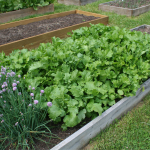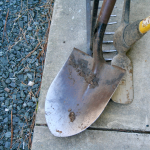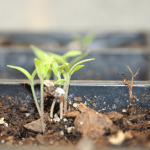There are many reasons gardeners should get a tetanus shot. Learn why you’re at risk of tetanus, and why it’s so dangerous, especially for gardeners.
Why Gardeners Should Get a Tetanus Shot
I can hear what you’re thinking now: “Oh for Pete’s sake, Jeanne! I just want gardening information! Show me some pretty plants or your funny cats and let’s get on with life.”
Patience, patience. Today is Wellness Wednesday, my weekly post on all things health and wellness. I started thinking the other day about how gardeners are at risk for tetanus. I guess I caught a new bulletin about tetanus vaccines or something. My thoughts turned to this unlikely topic, and I realized that most people are completely unaware that they need this important vaccine.
What is tetanus? It’s a bacteria that lives in the soil called Clostridium tetani. This bacteria is in animal excrement, in the soil, and sometimes in your homes. Don’t get grossed out now. I wrote an article a few days ago and my research uncovered the fact that over 30 to 75 species of insects live in the average home, so if you want something to get grossed out about, I can find plenty more things to share with you…
[Tweet “Gardeners should talk to their doctors about a tetanus booster. Learn more. #wellnessWednesday #health #gardening”]
Let’s get back to the topic of tetanus. It’s a very bad bacteria. Once it enters the skin, your body is very good at combating it and rendering it useless. However, if it gets deep into the skin into places where oxygen cannot penetrate, it produces toxins that can kill you in awful ways.
Want to know how poisonous it is? It’s second only to botulism in its horrific effects on the central nervous system. Think about THAT for a moment.
There are many, many reasons why you should ask your doctor if it’s time for a tetanus booster vaccines. I got mine last year at my request. It’s been about 10 years, and I was taught that you should get a booster every 10 years. Because of my involvement in gardening and with animals, I’m at a higher than normal risk of exposure to the bacteria. If you live and work on a farm, you may be, too.
“But wait,” I can hear you saying. “Isn’t the only way you can get tetanus from a rusty nail going into your foot?”
That’s what my mother told me as a kid, but I think it was just to make sure I put my shoes on when I went outside. Rusty nails or deep puncture wounds are just one way you can get tetanus. Any deep wound, or a wound that scabs over without healing properly, can foster tetanus!
Gardeners should get a tetanus shot because we are at risk for tetanus; our hands are always in the soil. I don’t know about you, but I’m always getting little nicks, cuts, and scrapes in the garden. Rose bush thorns, blackberry canes, weeds…you name it, something is out to get me. If that something contains tetanus bacteria, I want to know I am as protected as modern science can make me.
Here are five great reasons why gardeners should get a tetanus shot:
- Tetanus can kill you: The bacterial infection in your body produces a toxin that affects the central nervous system. It can cause seizures and brain damage.
- Tetanus can make you seriously ill: If it doesn’t kill you, it can cause contractions or seizures strong enough to break a bone. Hence the old-fashioned name “lock jaw” – the jaw is one of the bones that can snap if the muscles in the head and neck contract during a tetanus-induced seizure. It’s painful, ugly, and horrible.
- Only a little bit of the toxin can kill you. It’s a poison, after all. You can’t build up an immunity to it, and a small amount can overwhelm you.
- You’re sick before you know it: It takes three to 21 days for tetanus symptoms to show up, and by then you may have forgotten all about the original injury that allowed the bacteria to enter your body. That makes identifying the wound site all the more difficult for your doctor.
- Vaccines are cheap. Death isn’t. Vaccination for tetanus is commonplace, inexpensive, and safe. This is one vaccine that’s been around for a long time and is relatively safe for adults. The worst side effect is soreness in the injection site and arm for a day or two afterwards, especially if you’re getting booster shots.
If you haven’t had a tetanus shot in a while, or you can’t remember when you last had your tetanus shot, please speak with your doctor. Make an appointment for your annual check up and ask during the check up about tetanus boosters. Don’t risk death or serious illness just because of a little shot. All it takes is a bit of buried barbed wire hitting your hand, a cut from a nail in an old board, a rose thorn, to make you seriously ill. If you can prevent it, why not?
Gardeners should get a tetanus shot if they can, or a booster shot. Remember to take good care of yourself – your family and plants depend on you!
Here’s to #wellnessWednesday







